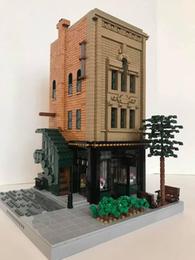 Posted on Facebook by Francie & Finch Bookshop, Lincoln, Neb.: "Did anyone see this amazing Lego sculpture of Francie & Finch Bookshop at Brick Days this weekend? Thanks Seth Lambert and LOLUG--Lincoln/Omaha LEGO User Group!"
Posted on Facebook by Francie & Finch Bookshop, Lincoln, Neb.: "Did anyone see this amazing Lego sculpture of Francie & Finch Bookshop at Brick Days this weekend? Thanks Seth Lambert and LOLUG--Lincoln/Omaha LEGO User Group!"
 Posted on Facebook by Francie & Finch Bookshop, Lincoln, Neb.: "Did anyone see this amazing Lego sculpture of Francie & Finch Bookshop at Brick Days this weekend? Thanks Seth Lambert and LOLUG--Lincoln/Omaha LEGO User Group!"
Posted on Facebook by Francie & Finch Bookshop, Lincoln, Neb.: "Did anyone see this amazing Lego sculpture of Francie & Finch Bookshop at Brick Days this weekend? Thanks Seth Lambert and LOLUG--Lincoln/Omaha LEGO User Group!"